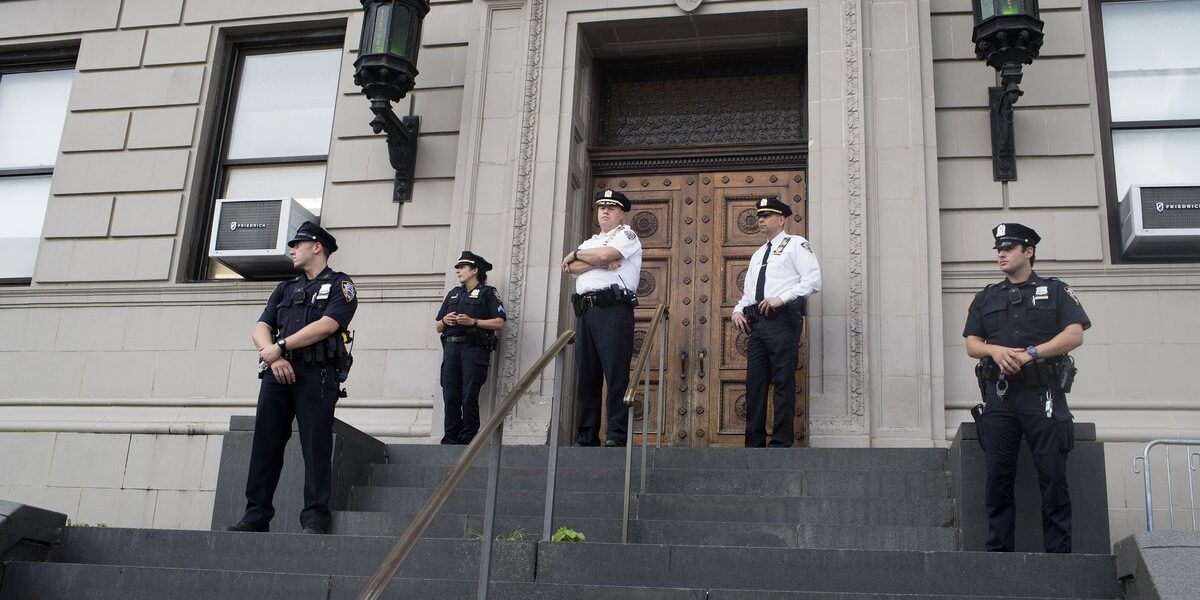Lawmakers push to staff each NYPD precinct with social workers. But where will they find them?
Lawmakers and advocates are asking the city to staff each of the city’s 77 NYPD precincts with a licensed social worker in a new City Council bill being introduced on Thursday.
The social workers would help connect crime victims and New Yorkers with mental illness with resources for treatment and long-term care, breaking the cycle of re-arrest, said Councilmembers Yusef Salaam and Erik Bottcher, who co-sponsored the bill.
But finding qualified social workers to fill the positions will be the hard part. A nationwide dearth of qualified social workers has hampered efforts to deploy more mental health experts to police emergencies, oftentimes with deadly results.
“For far too long our officers have shouldered the burden of addressing social and emotional needs beyond their scope of expertise,” said Salaam, who was wrongfully imprisoned as one of the exonerated Central Park Five. “These are issues that demand a delicate touch … and resources beyond what traditional law enforcement can provide.”
If it is voted into law, the plan would cost the city roughly $20 million annually, according to civil rights advocate Norman Siegel, who said it was a small price to pay compared to how much taxpayers spend on police misconduct lawsuits. Some of that misconduct could be mitigated by the presence of a mental health professional.
Siegel’s estimated price tag assumes the city’s Department of Health and Mental Hygiene would staff NYPD precincts with 231 social workers to fill three shifts per day at approximately $70,000 a year.
Salaam evoked the death of 19-year-old Win Rozario, whom police shot and killed in his kitchen in front of his mother and brother in March while he was experiencing a mental health crisis. Rozario’s family said at a news conference last week that police interrogated them for hours after the shooting, a trauma Salaam said could be avoided with health care professionals on hand.
The NYPD fatally shot 13 people in 2022, according to the department’s Use of Force reports — representing the highest number in a decade. Data for 2023 is not yet available but Gothamist has reported on seven fatal police shootings so far this year.
“Changing the culture is what we’ve been trying to do for decades,” Siegel said. “The first person who talks to [Win’s] family would be the social worker.”
The city’s efforts to provide an alternative response to 911 calls for people in crisis has funding and broad political support. But city officials and experts say there aren’t enough social workers.
Student debt and salary are two of the things driving that shortage. The debt rate for those graduating with social work degrees from private institutions is $70,000 on average, according to Debra McPhee, dean of the Fordham Graduate School of Social Service. That’s about the same as the salary for a social worker with the B-HEARD pilot program.
“Think about Gen Zs and millennials, think about work-life balance,” she said in a previous interview with Gothamist. “They’re not as prone as generations before them to sacrifice their lives and their financial security for their career.”
Graduating students still see social work as a calling, she said, just like prior generations. But since the COVID-19 pandemic, social workers are finding increasingly lucrative and flexible opportunities in virtual mental health counseling.
That “very much matches with Gen Zs and millennials who want to work remotely, who want to have flexible schedules, who want to often piece together different kinds of jobs, who don’t necessarily want to do a 9-to-9 [shift] in a nonprofit agency,” McPhee said, adding that government social workers have the additional burden of more paperwork than their private-sector colleagues.
There is a national shortage of social workers, who represent the country’s largest group of mental health care workers. That’s partly due to a demand resulting from the COVID-19 pandemic and the opioid crisis, according to Melissa Begg, dean of the Columbia School of Social Work, who also previously spoke to Gothamist.
On the supply side, Begg said, “The job is demanding and highly complex and we don’t pay enough. Unless our compensation scales meet the level of challenge that the job presents, this is going to be an ongoing problem.”
Dominique Wallace-Mills, who spoke to Gothamist after graduating from the Fordham Graduate School of Social Service last year, also said some social workers might be hesitant to work with police.
“We look at the person and environment, right? The totality of the person, what led up to this,” Wallace-Mills said. “The mindset for [police] is like, whatever the issue is, we’re going to address it right here, right now. No holds barred.”
Neither the NYPD nor the mayor’s office immediately replied to an inquiry.





